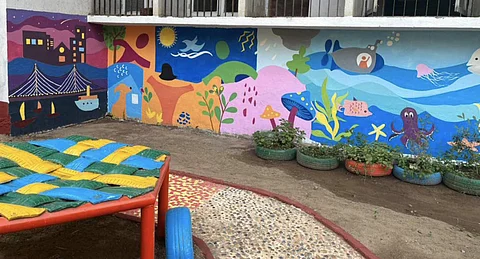

They say judging a child who has special needs does not define who they are, it defines the one who judges. We may have come a long way in accommodating those with special needs but the journey is still arduous and long before we can aspire to call it a seamless integration with the society. Taking a step at a time in the right direction is crucial and such work is being done by the Department of Special Education at SNDT Women's University in Mumbai. They will soon inaugurate a sensory garden at the university with assistance from the Akhil Autism Foundation. EdexLive caught up with Dr Sujata Bhan, Head of the Department of Special Education at the institute to know more about the vision behind the project, the state of affairs in special education today and understanding the steps moving forward. Excerpts from an enlightening conversation:
Can you bring me up to speed about the Department of Special Education at SNDT University and the work done there?
We have a small, self-supporting, experimental unit called Arushi, the primary goal of which is to help children with special needs that cannot be met by mainstream education. We have a team of experienced teachers, therapists, yoga instructors, computer teachers and more who come together to provide services to the kids in a very non-intimidating environment. We prepare an individualised education plan for each child. This enables them to grow to their optimum level of development. Some students have cleared the National Institute of Open Learning to gain admission to the college as well and others are taught vocations and have gone on to establish their own centres of merchandising, for instance. The students in the department are able to get hands-on learning at the Arushi centre of concepts that they gain in the classroom.
What are the key aspects of the sensory garden and how will it help children with special needs?
We wanted to focus on something which will enhance their cognitive development in a very playful manner. The sensory garden has different elements related to various senses in order to stimulate them. It has textual, tactile and olfactory elements that will engage the children in physical activities. A key aspect is the inclusivity of our setting as it is not just meant for children with special needs. We feel that it will allow all children to learn from each other and grow together. When we engage children in physical and play activities, their senses get heightened and that automatically leads to brain development and educational benefits.
Can you tell me a bit about contemporary research in the field of special education that throws light on our social institutions?
There is a lot of research being done on how inclusive education is better for a child with any disability. Studies have shown that a majority of students are such that if the teachers make the right accommodations, it works for them in an inclusive classroom even with special needs children. Contemporary research is in favour of inclusive classrooms because segregation only reinforces the idea of exclusion in their minds. This is very harmful especially in the long run. Of course, there would be some children with greater needs who require to be accommodated via separation.
How should the teaching curriculum be framed to enable maximum benefit for children?
The teaching and education curriculum needs to be devised in a way that modules on training children with special needs are integrated with the regular BEd and MEd programmes. Training in inclusive pedagogy is very essential for mainstream teachers. Even students getting trained in education with disabilities should diversify knowledge in multiple disabilities.
What do you have to say about the employability of children with special needs, especially in the context of social stigma surrounding them?
No two children with disabilities are alike. You have to see what the functional level of a particular child is. There are sheltered workshops that are created for these students. There are efforts by people out there who employ those with disabilities. For instance, the Lemon Tree chain of hotels is known to employ people with disabilities. So there needs to be more awareness regarding this among the people and the media has a big role to play in this. I was watching a film in which the relationship between Vidya Balan's character and her son who has cerebral palsy is shown so appropriately because there is no patronising of the child. That is how children with special needs deserve to be treated. There is still deep-rooted social stigma attached with disability and marginalisations. Just see the attitude of the people around you if they find a child of a prostitute or a transgender person. Policies need to be implemented and the media has to normalise appropriate behaviour towards the biologically marginalised. Only then would we be stigma-free.
